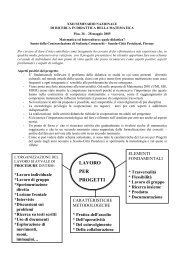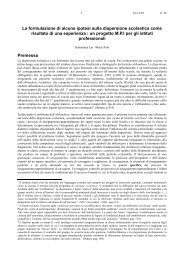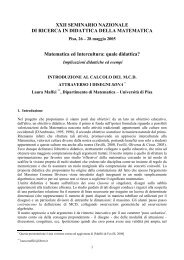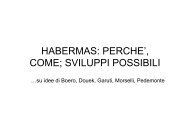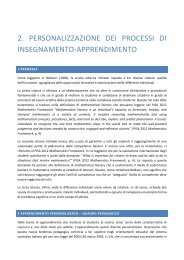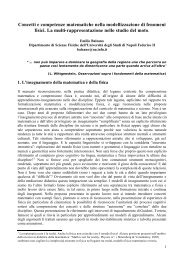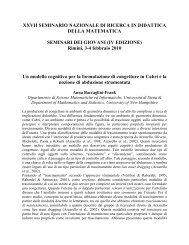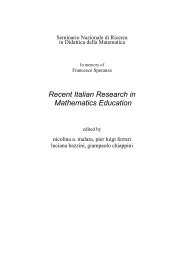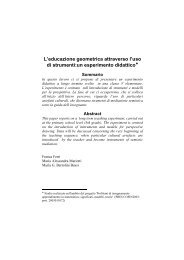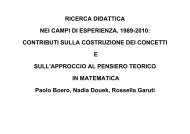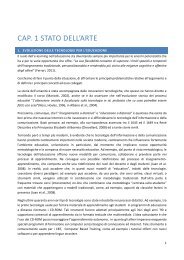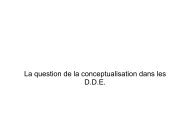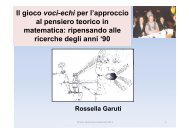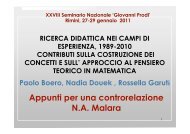vygotsky's everyday concepts/scientific concepts dialectics in school ...
vygotsky's everyday concepts/scientific concepts dialectics in school ...
vygotsky's everyday concepts/scientific concepts dialectics in school ...
Create successful ePaper yourself
Turn your PDF publications into a flip-book with our unique Google optimized e-Paper software.
they can be identified through the relationship established between comparison of<br />
transformations and a “real” dynamical situation, as well as through schematic (direct<br />
or mental) treatments of the static visible aspects and the dynamical, only th<strong>in</strong>kable,<br />
aspects. Hierarchic organisation between the various additive calculations, <strong>in</strong> relation<br />
to their <strong>in</strong>terpretation as static or dynamical, was an operational <strong>in</strong>variant, as well as<br />
the arithmetic theorems <strong>in</strong> action underly<strong>in</strong>g the numerical treatment.<br />
Concern<strong>in</strong>g students awareness:<br />
at the beg<strong>in</strong>n<strong>in</strong>g of the sequence one part of the students mastered the additive<br />
situation only through calculations. At the end, though, all of them were able to<br />
<strong>in</strong>terpret calculations <strong>in</strong> relation to the reference situation and give examples of<br />
comparable additive situations. They revealed then a conscious mastery of this<br />
additive situation and an ability to relate it or compare it to other situations (as<br />
compar<strong>in</strong>g <strong>in</strong>creases of children by compar<strong>in</strong>g <strong>in</strong>creases between two dates, and<br />
heights as <strong>in</strong>creases s<strong>in</strong>ce “birth”).<br />
CONDITIONS THAT ALLOWED THE VYGOSTKIAN DIALECTICS TO<br />
WORK<br />
The analysis of the didactical situation put <strong>in</strong>to evidence two ma<strong>in</strong> conditions that<br />
favoured the sett<strong>in</strong>g of this <strong>dialectics</strong> and its function<strong>in</strong>g.<br />
- The important use of the “reality”, the development of various expression about it<br />
and the development of <strong>everyday</strong> <strong>concepts</strong> <strong>in</strong> <strong>school</strong> context. This comes from the<br />
experience fields didactical sett<strong>in</strong>g, which implies mak<strong>in</strong>g sure that students are<br />
sufficiently <strong>in</strong>volved <strong>in</strong> some activities related to this “reality”, and important<br />
<strong>everyday</strong> <strong>concepts</strong> are explicitly shared, and enriched with verbal and other external<br />
representation through observations and discussions. In fact, <strong>everyday</strong> <strong>concepts</strong> do<br />
not quite correspond to spontaneous ones, though they rema<strong>in</strong> <strong>in</strong> the <strong>everyday</strong> stream<br />
of conceptualisation (cf Vygotsky, 1985, Chapt. 6).<br />
- Argumentative activity managed by the teacher allowed students to <strong>in</strong>terpret the<br />
situation, express and discuss their views, handle and compare various (verbal,<br />
schematic, numerical) external representations. It helped students to assimilate the<br />
new construction, because they had to express themselves <strong>in</strong> a variety of ways to<br />
answer to a variety of detailed questions. Argumentation played a dynamical role so<br />
that the dialectic could evolve.<br />
CONCLUSION<br />
Vygotsky’s <strong>scientific</strong> <strong>concepts</strong>/<strong>everyday</strong> <strong>concepts</strong> <strong>dialectics</strong> works as a powerful<br />
model for conceptualisation <strong>in</strong> teach<strong>in</strong>g and learn<strong>in</strong>g contexts. But through<br />
observation of examples such as the one reported here, I found that it can turn out to<br />
be also an efficient tool to plan teach<strong>in</strong>g situations <strong>in</strong> order to achieve some important<br />
educational aims <strong>in</strong> mathematics. The "experience fields" didactical sett<strong>in</strong>g does use<br />
this <strong>dialectics</strong> as one of the levers to develop conceptualisation, with some specific<br />
favourable conditions:



